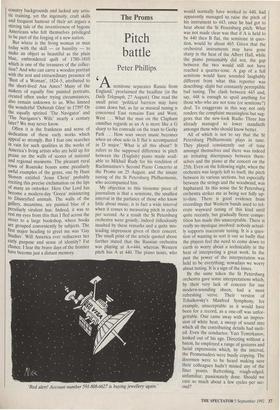The Proms
Pitch battle
Peter Phillips
Asemitone separates Russia from England,' proclaimed the headline (in the Daily Telegraph, 27 August). One read the small print: 'political barriers may have come down but, as far as musical tuning is concerned East remains East and West, West . . . What the man on the Clapham omnibus regards as an A is more like a G sharp to his comrade on the tram to Gorky Park . .. How sour sweet music becomes when an oboe solo in E flat is accompanied in D major.' What is all this about? It refers to the supposed difference in pitch between the (English) piano made avail- able to Mikhail Rudy for his rendition of Rachmaninov's Second Piano Concerto at the Proms on 25 August, and the innate tuning of the St Petersburg Philharmonic, who accompanied him.
My objection to this tiresome piece of journalism is that a semitone, the smallest interval in the parlance of those who know little about music, is in fact a wide interval when it comes to measuring pitch in cycles per second. As a result the St Petersburg orchestra were grossly, indeed ridiculously insulted by these remarks and a quite mis- leading impression given of their concert. The small print of the article quoted above further stated that the Russian orchestra was playing at A=444, whereas Western pitch has A at 440. The piano tuner, who 'Red alert! Account number 591-808-6627 is buying jewellery again.' would normally have worked to 440, had apparently managed to raise the pitch of his instrument to 443, once he had got to hear about the St Petersburg pitch. What was not made clear was that if A is held to be 440 then B flat, the semitone in ques- tion, would be about 465. Given that the orchestral instruments may have gone sharp in the heat of the Albert Hall, while the piano presumably did not, the gap between the two would still not have reached a quarter-tone. A gap of a full semitone would have sounded laughably different from what this reporter was describing: slight but constantly perceptible bad tuning. The clash between 443 and, say, 448 is enough to spoil anything for those who who are not tone (or semitone?) deaf. To exaggerate in this way not only renders the complaint meaningless but sug- gests that the new-look Radio Three has already managed to lower standards amongst those who should know better.
All of which is not to say that the St Petersburg Philharmonic plays in tune. They played consistently out of tune amongst themselves and there was indeed an irritating discrepancy between them- selves and the piano at the concert on the 25th. Even on the following night, when the orchestra was largely left to itself, the pitch between its various sections, but especially between the strings and the woodwind, was haphazard. In this sense the St Petersburg orchestra strikes me as being not fully up- to-date. There is good evidence from recordings that Western bands used to tol- erate wayward tuning of this kind until quite recently, but gradually fierce compe- tition has made this unacceptable. There is really no mystique involved: nobody actual- ly supports inaccurate tuning. It is a ques- tion of wanting to sort it out so badly that the players feel the need to come down to earth to worry about a technicality in the heat of interpreting a great work. In the past the power of the interpretation was held to be everything; nowadays we worry about tuning. It is a sign of the times.
By the same token the St Petersburg orchestra gave some interpretations which, by their very lack of concern for our modern-sounding sheen, had a most refreshing verve. Their version of Tchaikovsky's Manfred Symphony, for example, unacceptable as it would have been for a record, as a one-off was unfor- gettable. One came away with an impres- sion of white heat, a sweep of sound into which all the contributing details had melt- ed. Even the conductor, Yuri Temirkanov, looked out of his age. Directing without a baton, he employed a range of gestures and facial expressions which, by the interval, the Promenaders were busily copying. The doormen were to be heard making sure their colleagues hadn't missed any of the finer points. Refreshing, rough-edged, unfamiliar, passionately done. Should we care so much about a few cycles per sec- ond?


















































 Previous page
Previous page